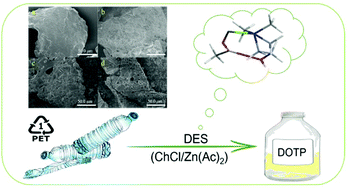Alcoholysis of polyethylene terephthalate to produce dioctyl terephthalate using choline chloride-based deep eutectic solvents as efficient catalysts†
Abstract
Dioctyl terephthalate (DOTP) is a new kind of green and non-toxic plasticizer. The traditional process to prepare DOTP is costly and complicated, thus it is very necessary to find an efficient and environmentally-friendly way to obtain DOTP. In this study, we prepared DOTP from the alcoholysis of polyethylene terephthalate (PET) by using 2-ethyl-1-hexanol (2-EH) as the solvent, and used choline chloride-based deep eutectic solvents (ChCl-based DESs) as the catalysts due to their cheapness, low toxicity and ease of preparation. Under the optimized conditions (ChCl/Zn(Ac)2 1 : 1, 5 wt%, 180 °C, 60 min, PET : 2-EH 1 : 5 molar ratio), the conversion of PET and the yield of DOTP were 100% and 84.7%, respectively. Furthermore, the possible mechanism was proposed through density functional theory (DFT) calculations and experimental results. It revealed that the hydrogen bonds (H-bonds) formed between 2-EH and DESs played a key role in accelerating the degradation process. Furthermore, the kinetics of the reaction was also investigated, and the results indicated that the alcoholysis of PET is a first-order reaction with an activation energy of 95.05 kJ mol−1. This work confirmed that ChCl-based DESs are favorable for the degradation of PET to prepare DOTP under mild conditions, which can also be used for other polymer degradation strategies.



 Please wait while we load your content...
Please wait while we load your content...